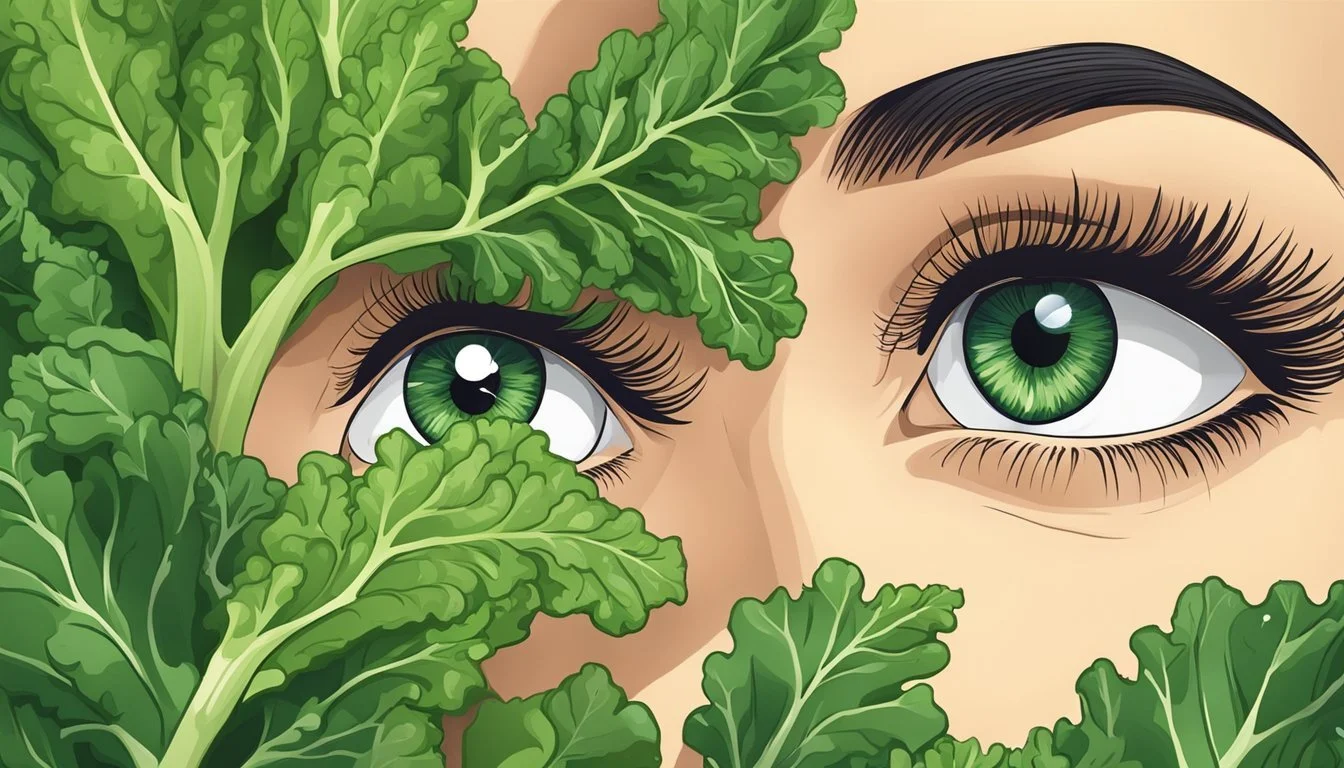Vision-Boosting Superfoods: Nourish Your Eyes from Within
Maintaining eye health is essential for overall well-being and quality of life. One effective way to support eye health is through diet. Including specific nutrient-rich foods in daily meals can help reduce the risk of developing serious eye conditions and maintain good vision.
While there are numerous nutrients known to benefit eye health, the key is a balanced and varied diet. By regularly consuming a variety of fruits, vegetables, fish, and other beneficial foods, individuals can protect their eyes and enjoy better vision for years to come.
1) Carrots
Carrots are well-regarded for their positive effects on eye health. They contain beta-carotene, a precursor to vitamin A. Beta-carotene is crucial as it helps produce rhodopsin, a pigment needed for low-light vision.
In addition to supporting vision in dim light, vitamin A is vital for maintaining the health of the cornea. The cornea is the eye's outermost layer and essential for focusing vision.
Carrots also have antioxidative properties. These antioxidants help protect the eyes from oxidative stress and damage.
Though carrots are beneficial, they should be part of a balanced diet. Combining them with other nutrient-rich foods can enhance their eye-protective benefits.
2) Spinach
Spinach stands out as a powerhouse for eye health. Rich in vitamins C and E, it supports overall vision improvement. The leafy green is especially abundant in lutein and zeaxanthin, antioxidants that protect against harmful free radicals.
Eating spinach can reduce the risk of macular degeneration. This condition is one of the leading causes of vision loss. Consuming it raw might provide the most antioxidants, ensuring maximum benefits.
Incorporating spinach into your diet is simple. Add it to salads, smoothies, or even as a side dish. Regular consumption leads to improved eye health, making it an easy and effective dietary addition.
3) Kale
Kale stands out as a significant vegetable for eye health due to its rich content of essential nutrients.
Packed with vitamins A, C, and E, kale provides powerful antioxidants. These vitamins protect the eyes from oxidative stress and potential damage.
The presence of carotenoids, lutein, and zeaxanthin in kale is particularly beneficial. These compounds help filter harmful blue light and maintain healthy vision.
Kale also contains beta-carotene, which the body converts into vitamin A. This vitamin is crucial for maintaining good vision and preventing night blindness.
Regular consumption of kale supports the retina, helping to improve overall eye function. Adding kale to one's diet is a practical step towards preserving eye health.
4) Sweet Potatoes
Sweet potatoes are a rich source of beta-carotene, a precursor to vitamin A. This nutrient is essential for maintaining healthy vision. Once consumed, the body converts beta-carotene into vitamin A, which supports the proper functioning of the retina.
Vitamin A plays a crucial role in preventing night blindness and reducing the risk of age-related macular degeneration. The antioxidants found in sweet potatoes help combat oxidative stress in the eyes.
These tubers also provide other nutrients like vitamin C and vitamin E. Both have protective effects against the development of cataracts and other eye conditions. Including sweet potatoes in your diet can contribute to better ocular health.
Eating sweet potatoes regularly can be a natural way to support vision health. They are versatile and can be prepared in various ways, such as baking, mashing, or adding to stews and salads.
5) Salmon
Salmon stands out as a prominent food for eye health due to its high content of omega-3 fatty acids. These essential nutrients are known to support overall eye function and may help protect against conditions like dry eyes and age-related macular degeneration (AMD).
In addition to omega-3s, salmon is rich in vitamin D, which plays a role in reducing the risk of cataracts. The presence of niacin (Vitamin B3) in salmon also supports overall eye health by contributing to proper cell function and circulation.
Regular consumption of salmon, along with other fatty fish such as tuna and trout, ensures a steady intake of these beneficial nutrients. Including salmon in a balanced diet can thus be a significant step toward maintaining and boosting eye health.
6) Oysters
Oysters are an exceptional source of zinc, a mineral crucial for maintaining eye health. Zinc plays a vital role in transporting vitamin A from the liver to the retina, which helps produce melanin, a protective pigment in the eyes.
Zinc-rich foods like oysters can help reduce the risk of age-related macular degeneration (AMD) and night blindness. Studies indicate that higher zinc intake can slow the progression of AMD, making oysters a valuable addition to the diet for those concerned about their long-term eye health.
In addition to zinc, oysters are packed with omega-3 fatty acids. These fats are known for their anti-inflammatory properties and contribute to maintaining the structural integrity of retinal cells. Regular consumption of oysters can provide a dual benefit by supplying both zinc and omega-3 fatty acids, essential for overall eye maintenance.
Incorporating oysters into a balanced diet can be simple. They can be enjoyed raw, steamed, grilled, or added to stews and soups. Their versatility makes it easy to include this nutrient-dense food in various meals, promoting better eye health in a flavorful way.
7) Almonds
Almonds are a rich source of vitamin E, which plays a crucial role in maintaining eye health. This powerful antioxidant helps protect the eyes from damage caused by free radicals. Consuming a handful of almonds daily can provide nearly half of the recommended daily amount of vitamin E.
In addition to vitamin E, almonds contain healthy fats that are beneficial for overall eye function. These monounsaturated fats help maintain the structural integrity of cell membranes in the eyes. Including almonds in the diet can contribute to better vision and a reduced risk of age-related eye conditions.
Almonds are also easy to incorporate into various meals. They can be added to cereal, salads, or eaten as a snack. Their versatility makes it simple to include them in a balanced diet while reaping the eye-related benefits.
8) Blueberries
Blueberries contain significant nutrients that benefit eye health. They are rich in vitamin C, which strengthens blood vessels in the eyes. This vitamin also plays a crucial role in collagen synthesis, supporting the structure of the eyes.
Antioxidants are another key component found in blueberries. These help reduce oxidative stress, which can protect against retinopathy and other eye-related conditions. Consumption of blueberries may contribute to better ocular blood flow, potentially aiding in conditions like glaucoma.
Incorporating blueberries into the diet can be simple and enjoyable. Options include adding them to smoothies, salads, or even making blueberry muffins. These easy additions ensure that the eye-health benefits of blueberries are readily accessible.
Furthermore, studies suggest that the bioactive compounds in blueberries, such as anthocyanins, support overall eye function. Regular intake of these compounds may help maintain vision quality as part of a balanced diet.
9) Bell Peppers
Bell peppers are a vibrant and nutritious addition to any diet, particularly for eye health. Rich in vitamin C, they contribute to maintaining the health of blood vessels in the eyes, reducing the risk of cataracts.
These colorful vegetables also contain significant amounts of beta-carotene, which the body converts into vitamin A, crucial for good vision.
Lutein and zeaxanthin, two powerful antioxidants found in bell peppers, help protect the eyes from harmful blue light and reduce the risk of age-related macular degeneration (AMD).
Bell peppers are versatile and can be eaten raw, cooked, or added to a variety of dishes, making it easy to incorporate them into daily meals for consistent eye health benefits.
10) Citrus Fruits
Citrus fruits like oranges, grapefruits, tangerines, and lemons are excellent for eye health.
They are rich sources of vitamin C, an antioxidant that protects the eyes from damage caused by free radicals. This protection can prevent or delay cataracts and age-related macular degeneration.
Additionally, citrus fruits help maintain the health of blood vessels in the eyes. Including these fruits in your diet can be a simple way to support long-term eye health.
Nutritional Impact on Eye Health
Certain nutrients are proven to benefit eye health significantly, helping protect against conditions such as age-related macular degeneration (AMD) and cataracts. These nutrients include specific vitamins, antioxidants, and minerals.
Vitamins and Antioxidants
Vitamin A is crucial for maintaining good vision. It plays a fundamental role in forming rhodopsin, a protein that absorbs light in the retina. Foods rich in vitamin A include carrots, sweet potatoes, and dark leafy greens.
Vitamin C and E act as antioxidants, helping protect the eye from damage caused by free radicals. Citrus fruits, broccoli, and Brussels sprouts are good sources of vitamin C. Nuts and seeds, such as almonds and sunflower seeds, provide ample vitamin E.
Lutein and Zeaxanthin are antioxidants found in high concentrations in the retina. These nutrients help filter harmful blue light and protect against macular degeneration. They are present in foods like kale, spinach, and corn.
Minerals and Their Benefits
Zinc is vital for eye health as it plays an essential role in transporting vitamin A from the liver to the retina to produce melanin, a protective pigment in the eyes. Oysters, beef, and pork are rich in zinc.
Selenium, another important mineral, works together with antioxidants to protect the eyes from oxidative damage. It is found in seafood, Brazil nuts, and eggs.
These minerals support overall eye function and health, reducing the risk of chronic eye conditions, including AMD and cataracts.
By incorporating these vitamins, antioxidants, and minerals into the diet, individuals can support and maintain optimal eye health.
Foods That Support Vision
Certain foods can play a significant role in sustaining good vision. These include leafy greens rich in vitamins and antioxidants, fish abundant in omega-3 fatty acids, and nuts and seeds providing essential nutrients for eye health.
Leafy Greens
Leafy greens like kale, spinach, and collard greens are packed with vitamins C and E, along with lutein and zeaxanthin. These carotenoids help filter harmful blue light and act as antioxidants in the eye. Regular consumption of these greens can aid in reducing the risk of cataracts and age-related macular degeneration (AMD).
Kale, for example, contains over 20 milligrams of lutein and zeaxanthin per serving. Spinach and collard greens offer a similar amount and are easily incorporated into salads, smoothies, and cooked dishes. Incorporating these vegetables can provide your eyes with necessary nutrients.
Fish and Omega-3 Fatty Acids
Cold-water fish such as salmon, tuna, sardines, halibut, and trout are excellent sources of omega-3 fatty acids. These nutrients are essential for maintaining the structural integrity of the cell membranes in the eyes. Omega-3 fatty acids help prevent dry eyes and may reduce the risk of AMD and glaucoma.
A diet rich in omega-3s can also support overall retinal health. For example, a regular serving of salmon provides over 1,500 milligrams of omega-3s. Including these fish in meals several times a week ensures that the eyes receive necessary fatty acids.
Nuts and Seeds
Nuts and seeds such as almonds, sunflower seeds, and hazelnuts are high in vitamin E, which protects eye cells from damage caused by free radicals. This nutrient plays a crucial role in preventing cataracts and AMD. Additionally, seeds like chia and flaxseeds are rich in omega-3s, further contributing to eye health.
A handful of almonds provides about half of the daily recommended amount of vitamin E. Regularly snacking on nuts and seeds or adding them to dishes can offer continuous protection against eye-related diseases, supporting long-term vision health.
Dietary Tips for Healthy Eyes
Specific dietary choices can significantly impact eye health by providing essential nutrients, maintaining hydration levels, and avoiding harmful foods.
Balancing Nutrients
A diet rich in antioxidants and essential vitamins helps maintain eye health. Vitamin A, found in carrots and sweet potatoes, is crucial for good vision.
Leafy greens such as spinach and kale are packed with lutein and zeaxanthin, which protect against macular degeneration. Including omega-3 fatty acids, present in fish like salmon and tuna, supports retinal health.
Nuts and seeds, particularly almonds and flaxseeds, are excellent sources of Vitamin E and can prevent cataracts.
Hydration Importance
Keeping the eyes well-hydrated is essential for preventing dryness and irritation. Drinking ample water throughout the day helps to maintain the moisture balance in the eyes.
Foods with high water content such as cucumbers, watermelon, and oranges also contribute to hydration.
Avoiding excessive caffeine and alcohol intake is also crucial, as they can lead to dehydration and negatively affect eye health.
Avoiding Harmful Foods
Certain dietary choices can harm eye health. Avoid excessive consumption of highly processed foods and sugary snacks, as they can increase the risk of developing eye conditions like diabetic retinopathy.
High salt intake can lead to increased blood pressure, potentially damaging the blood vessels in the eyes. Opt for fresh, whole foods over pre-packaged items.
Lastly, reducing trans fats and saturated fats found in fried foods and baked goods can help protect eye health.






